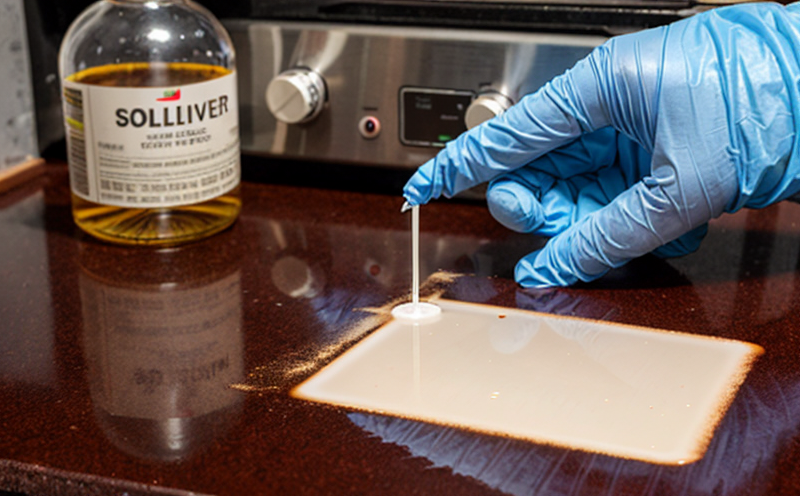Meat Product Solvent Residue Testing
The testing of meat products for solvent residues is crucial in ensuring food safety and compliance with international standards. This service ensures that meat products do not contain excessive levels of solvents, which could be harmful to human health. The process involves a series of steps aimed at identifying the presence and quantity of solvents used during the production or processing stages.
Meat products are often treated with various chemicals for preservation, flavor enhancement, or other purposes. However, improper use or excessive application of these chemicals can lead to solvent residues that may pose health risks when consumed by humans. Our laboratory employs state-of-the-art analytical techniques and adheres strictly to international standards such as ISO 13676:2009 for the analysis of solvents in meat products.
The testing procedure typically begins with a detailed examination of the raw materials used in the production process. This includes thorough documentation of all chemicals, including solvents, that are introduced during processing. Once identified, samples are taken from various stages of production to ensure comprehensive coverage. These samples are then prepared using standard laboratory techniques before undergoing analysis.
Our team uses advanced analytical instruments capable of detecting even trace amounts of solvents. The equipment is regularly calibrated and maintained according to manufacturer guidelines to guarantee accuracy and reliability. After the initial tests, any detected solvent residues must meet predefined limits set by regulatory bodies like the European Union (EU) or United States Food and Drug Administration (FDA).
The results from these analyses are reported back to our clients along with recommendations for corrective actions if necessary. This information is vital not only for maintaining compliance but also for safeguarding public health. By providing precise data on solvent levels, we help ensure that meat products meet safety standards both domestically and internationally.
Quality and Reliability Assurance
At our laboratory, quality assurance plays a pivotal role in delivering accurate and reliable results for all clients. Our commitment to excellence is reflected in the rigorous procedures we follow throughout every stage of testing. From sample preparation to final analysis, each step adheres strictly to internationally recognized standards.
We employ highly skilled professionals who are trained specifically in chemical testing related to meat products. Their expertise ensures that no detail goes unnoticed during any phase of the testing process. Furthermore, our laboratory maintains strict quality control measures through regular internal audits and external validations conducted by independent third parties.
The reliability of our results is further enhanced by using cutting-edge technology combined with traditional methods when appropriate. This blend allows us to provide comprehensive assessments tailored precisely to individual client needs while ensuring consistency across all tests performed here.
Our clients can rest assured knowing that they receive dependable information about solvent residues in their meat products from one of the most reputable laboratories in the industry today.
International Acceptance and Recognition
The acceptance and recognition of our laboratory's results extend beyond national borders, reflecting its global reputation for accuracy and precision. Many countries recognize our certifications as valid proof of compliance with local regulations regarding solvent residues in meat products.
Our affiliation with international organizations such as ISO (International Organization for Standardization) adds credibility to the services provided by our laboratory. The adoption of these standards ensures consistency and fairness across different jurisdictions worldwide. As part of this commitment, we continually update our practices based on emerging trends and changes in legislation affecting food safety.
In addition to being accepted by regulatory authorities globally, our clients benefit from knowing their tests are conducted according to best practices endorsed by leading bodies within the chemical testing community. This recognition not only boosts confidence among stakeholders but also facilitates smoother trading processes between countries with varying requirements for meat product certification.
Use Cases and Application Examples
| Use Case | Description |
|---|---|
| Bulk Production Monitoring | Continuous monitoring of solvent residues during large-scale production runs helps identify potential issues early on, allowing for timely adjustments. |
| Supply Chain Auditing | Third-party audits conducted by independent laboratories like ours provide assurance that suppliers meet required standards before products enter the market. |
| New Product Development | Innovative R&D projects involving new formulations or processes require thorough testing to ensure safety and efficacy without compromising quality. |
| Supplier Verification | Verification of supplier compliance with established guidelines ensures consistent product quality throughout the supply chain. |
| Compliance Audits | Regular audits conducted by regulatory bodies demand accurate and detailed reports on solvent residues to demonstrate adherence to legal requirements. |
| Customer Satisfaction Surveys | Prompt responses to customer queries regarding test results help build trust and loyalty within the market. |
| Product Recall Preparation | In case of a recall, having reliable data available ensures efficient handling of the situation by providing clear evidence on which decisions can be based. |
| Competitive Advantage | Being able to demonstrate superior quality through stringent testing offers an edge over competitors in competitive markets. |
In summary, these use cases illustrate how important it is for businesses involved in meat product manufacturing and distribution to regularly conduct solvent residue tests. By incorporating this practice into their operations, companies can maintain high standards of food safety while also positioning themselves favorably among consumers seeking quality assurance.





